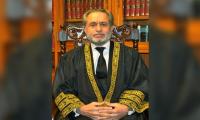LONDON: The London High Court has heard that Westminster Magistrates’ Court judge’s decision of Pakistani national Jabir Motiwala’s extradition to the US was wrong as the Karachi businessman faces a real risk of a sentence for life without parole and his extradition will be oppressive, breaching his rights under Article 3 of the European Convention on Human Rights (ECHR).
Over the course of a two-day hearing, the London High Court judges heard from Queen’s Counsel Edward Fitzgerald, QC, that the real target of the Federal Bureau of Investigation (FBI) through its entrapment operation was not Jabir Motiwala but Dawood Ibrahim’s alleged D-Company; however, Jabir was trapped and then arrested in London when nothing was found about the D-Company and its activities.
As reported exclusively in The News last week, the court was informed by Edward Fitzgerald, QC, that the Federal Bureau of Investigation (FBI) former spy Kamran Faridi and his wife Kelly Faridi have provided evidence, alleging that FBI bosses asked their agent Pakistani national Kamran Faridi to trap Jabir Motiwala into committing criminal acts of money-laundering and drugs import. Kamran Faridi has said in his evidence that he wanted to become a witness in the case on the call of his conscience and that he was the FBI agent who set a trap for Motiwala and wronged him.
Jabir Motiwala’s lawyer told the court that the extradition judge was wrong to rule that there was no real risk of a terrorism uplift; wrong to rule that Jabir will not live in inhumane conditions in the Metropolitan Detention Centre (or MCC); wrong to rule that Jabir would not be subjected to unjust or oppressive rule; wrong to rule that the process would not be abused; and that the new evidence admitted by Sir Ross Cranston establishes a further basis on which to find that these proceedings are an abuse of process. The QC said that the US government had told the court it had no “present intention” to seek a terrorism enhancement but provided “no reliable assurance” that terrorism charges will not be added when Jabir is in the US custody and that means “a sentence of life without parole”.
The lawyer told the court that the US witnesses helped the court through cross-examination and their expert statements as to how the US will apply the death sentence on Jabir Motiwala when he is in the US custody but that was not taken into consideration by the district judge.
Edward Fitzgerald, QC, said that Jabir was not being pursued for allegations of terrorism offences but the US has accused him of being a “top lieutenant” of Dawood Ibrahim, the alleged head of D-Company, although, no evidence of any involvement of Dawood Ibrahim or Motiwala’s involvement with the D-Company was shown to the court at any stage. The QC said that since D-Company has been declared a terrorist entity by the US, that means aggravating conduct can be considered in passing sentence, including matters not alleged in any specific indictment but alleged by prosecution.
Jabir’s lawyer told the court that two expert witnesses had told the court that Jabir will be subjected to live in inhumane prison conditions and there was an overwhelming evidence that Jabir will be detained in inhumane conditions.
Edward Fitzgerald told the court that Jabir Motiwala was a “vulnerable person suffering from mental disorder” and had “suicidal tendencies” and would suffer in the two suggested detention facilities. The court heard that Jabir Motiwala was “a person with a history of depression and at least three suicide attempts” and that his basic mental health history was recognised by the district judge in his judgment.
The court was informed that former FBI agent Kamran Faridi had recorded a message that he “set up Jabir”; that “the FBI are putting pressure on me”; that “the FBI gave me money”; that “the US were trying to link Motiwala with state terrorism charges”; and that “the investigation was performed illegally in Dubai”. A further voice recording from Kamran Faridi on 8 March referred to him being asked to fabricate evidence in order to extradite Jabir Motiwala.
Faridi’s American wife Kelly Faridi, according to the QC, told Jabir’s solicitors that “Kamran was told that the FBI didn’t have sufficient evidence against Jabir and wanted him to lie further”; that “Jabir just got sucked into the case” and that “Kamran’s target was not Jabir. D-Company was. They were unable to make a case against whoever it is that they wanted, so they got Kamran to make a case against him (Jabir)”.
Jabir is represented by counsel, Edward Fitzgerald, QC, and Daniel Sternberg and lawyers Deepak Vij and Amirah Ajaz of ABV Solicitors.
Earlier this year, Motiwala was granted leave to appeal against his extradition to the United States on the charges of alleged extortion, blackmailing, and import of A class drugs – charges which the Pakistani national strongly denies. Judge Honourable Sir Ross Cranston at the London High Court allowed the Pakistani national to file an appeal against the US bid to extradite him. The Karachi businessman has been in the high security Wandsworth Prison for nearly three years without any conviction and without being admitted on bail.
It must be recalled that Qatar has already deferred dispatch of five LNG cargoes to 2026, which were supposed to reach...
South Asia, with its diverse economies and vibrant cultures, holds a unique position in the global economic framework
SAFA brings together accounting bodies from eight member countries to promote harmonisation of accounting standards
ICAP fosters collaboration for sustainable economies worldwide, empowering individuals and organisations alike
SAFA Conference embodies a collective vision to navigate challenges, unlock opportunities
Minister says Hafeezullah Niazi, father of Hassan Niazi, was certainly going through a difficult time







